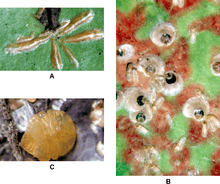Diaspididae
| Diaspididae | |
|---|---|
 | |
| Three species of armored scales | |
| Scientific classification | |
| Kingdom: | Animalia |
| Phylum: | Arthropoda |
| Class: | Insecta |
| Order: | Hemiptera |
| Suborder: | Sternorrhyncha |
| Superfamily: | Coccoidea |
| Family: | Diaspididae |
| Subfamilies | |
| |
Diaspididae is the largest family of scale insects with over 2650 described species in around 400 genera. As with all scale insects, the female produces a waxy protective scale beneath which it feeds on its host plant. Diaspidid scales are far more substantial than those of most other families, incorporating the exuviae from the first two nymphal instars and sometimes faecal matter and fragments of the host plant. These can be complex and extremely waterproof structures rather resembling a suit of armor. For this reason these insects are commonly referred to as armored scale insects. As it is so robust and firmly attached to the host plant, the scale often persists long after the insect has died.
Some African Diaspididae are attended by ants of genus Melissotarsus. The ants appear to consume the armored scales because Diaspididae are completely naked when ant-attended; the ant nest itself remains completely hidden under the bark of the tree.[1]
Selected species
Well-known species include:
- Abgrallaspis cyanophylli, the cyanophyllum scale
- Aonidiella aurantii, the California red scale
- Aonidomytilus crookiae the St. John's Wort Scale
- Aulacaspis yasumatsui, the cycad aulacaspis scale
- Lepidosaphes beckii, the citrus mussel scale
- Lepidosaphes ulmi, the oystershell scale
- Diaspidiotus perniciosus, the San Jose scale
Genera
References
- ↑ Delabie, J.H.C. (2001). "Trophobiosis between Formicidae and Hemiptera (Sternorrhyncha and Auchenorrhyncha): an overview". Neotropical Entomology. 30 (4): 501–516. doi:10.1590/S1519-566X2001000400001.
- Борхсениус (Borchsenius), Н. С. (N. S.) (1966). Каталог щитовок (Диаспидоидеа) мировой фауны (A catalogue of the armoured scale insects (Diaspidoidea) of the world) (in Russian). Moscow: Академия наук СССР – Зоологический институт (Zoological Institute of the USSR Academy of Sciences).
- Howard, Forrest D. (2001). "Hemiptera: Sternorrhyncha". In Howard, Forrest D.; et al. Insects on Palms. Wallingford, Oxfordshire: CABI Publishing. pp. 161&ndash, 226. ISBN 978-0-85199-326-3.
- Takagi, Sadao (2002). "One new subfamily and two new tribes of the Diaspididae (Homoptera: Coccoidea)" (PDF). Insecta Matsumurana. 59: 55–100. Archived (PDF) from the original on 28 December 2013.
External links
- Diaspididae at ScaleNet
- Aulacaspis yasumatsui, cycad aulacaspis scale
- Comstockiella sabalis, palmetto scale
- Diaspis boisduvalii, boisduval scale
- Fiorinia theae, tea scale
- Ischnaspis longirostris, black thread scale
- Pseudaulacaspis cockerelli, false oleander scale
- Pseudaulacaspis pentagona, white peach scale
| Wikispecies has information related to Diaspididae |